Misty | Interview | “Progressive rock meet psychedelic pop”
Misty was a UK band playing a dazzling fusion of classically-inspired progressive rock and song-based psychedelic pop with an organ-based sound, in the vein of Procol Harum and The Nice.
Guerssen imprint Sommor recently issued the first ever vinyl release of the album recorded in 1969/70, Including their terrific mod-psych classic ‘Hot Cinnamon’. After only a handful of gigs, Misty signed a deal with Parlophone and recorded ‘Hot Cinnamon’ / ‘Cascades’ single 45, which received some airplay, but still failed to hit the charts and sadly the band’s hopes of releasing their debut album were dashed. Misty went their separate, ‘Here Again’ master tapes sat gathering dust on a shelf until Misty band member Michael Gelardi came across the original acetate and decided it was time for the album to finally see the light of day.
‘Here Again’ by Misty | Vinyl (Sommor) will be available February 16th 2024 via this link.
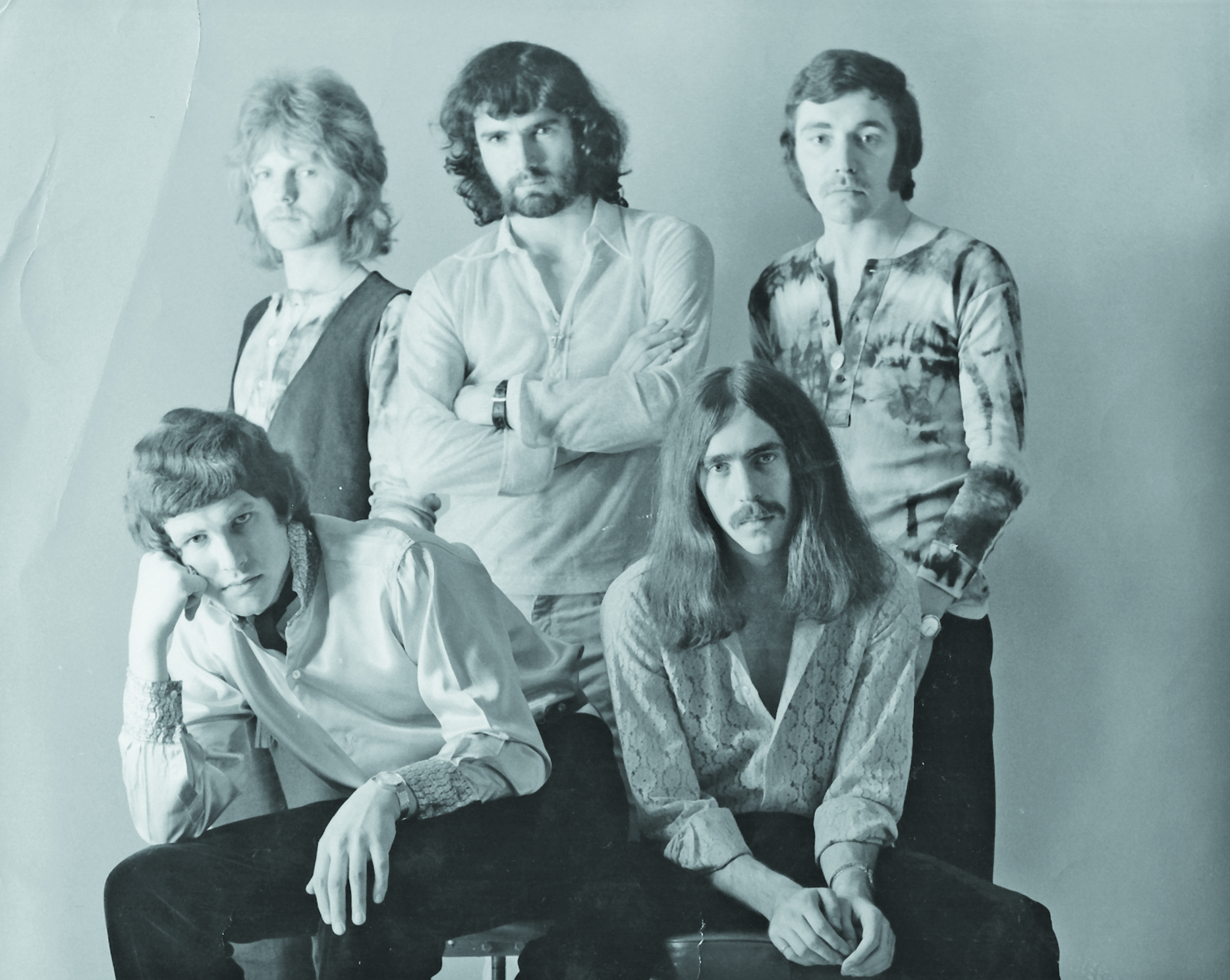
“The sessions were incredibly professional because the band was so tight and well rehearsed”
Where and when did you grow up? Was music a big part of your family life? Did the local music scene influence you or inspire you to play music?
Michael Gelardi: I was born and spent most of my childhood in South Africa. Me and my mother were the only musical members of my family, and mother made sure that I was given classical piano lessons from an early age. The local African (“Kwela” in particular) music fascinated me and my father ran hotels which had ballrooms featuring piano entertainers and big bands which, living in the hotel, we could hear every night from our bedroom. This gave me a broad awareness of music from Rachmaninov to Duke Ellington.
Steve Bingham: I was born in Solihull which is in the West Midlands in 1949. There was always music being played on the radio but it was very old fashioned stuff that I didn’t like! However I was suddenly enthused by hearing American rock and roll records which my older sister started to buy from the local record shop and suddenly the house was full of Elvis Presley, The Everly Brothers, Bill Hayley, Buddy Holly and Little Richard! That really got me interested in actually playing myself. There were some great bands emerging from Birmingham and it was a very exciting time and I wanted to be part of it!
When did you start playing music? What was your first instrument? Who were your major influences?
Michael Gelardi: My first memory of a piano lesson was about seven years old in Durban with a very pretty young teacher. One strong memory of this time was my mother actually hauling me kicking and screaming out of a cinema and The Wizard of Oz to go to a piano lesson. Later we moved to Johannesburg and I had lessons from a rather strict concert pianist called Mrs. Blouet, whose tough keyboard exercises sometimes drove me to tears, but gave me the technique I value to this day. Miss Pepper, my teacher when we came to England, was somewhat uninspiring but put on concerts for her students which gave me my first experience of playing in public. My major influences I guess were and still are quite varied, from Bach/Handel/Scarlatti/Chopin to Jimmy Smith/Duke Ellington/Alan Price.
Steve Bingham: I was always attracted to the sound of the bass especially when the early Tamla Motown Records began to be played on British Radio. Eventually my mum and dad bought me a second hand Rosetti semi acoustic bass guitar when I was about thirteen. I did have lessons after my first failures and thankfully my teacher taught me stuff that I still use today. After a couple of years learning the instrument I upgraded to a second hand 1963 Fender Precision which I have recently restored and it still plays beautifully today! By that time I was really into Soul and Tamla Motown and discovered that the same bass player was playing on all the incredible Motown records! He was none other than the great James Jamerson who is still regarded by many (including me) as the greatest bass player of all time. I still play many of the bass lines invented by James Jamerson and every bass player I know has been influenced by him in one way or another.
Were you a member of any bands before forming Misty?
Michael Gelardi: My first band I joined when I got a scholarship to Catholic public school, St George’s College, Weybridge in Surrey, doing my O Levels. Our manager knew The Roulettes (Adam Faith’s backing band) as well as singer/songwriter Chris Andrews, who had written all Sandie Shaw’s big hits to date, and indeed had his own Top 10 hits including ‘Pretty Belinda’ and ‘Yesterday Man’. My first ever recording session was on keyboards for Chris and he arrived in a gold coloured Maserati. I thought “that’s what I want one day” (I ended up close – with a Ferrari several years later!) He also brought a crate of beers and brandy for the session! We started at about 7pm, recording demo songs he had written for Sandie’s Eurovision entry that evening, and finished when I got home at 5am, only to have to get up to go to school at 8am – not sure how my concentration was that day! My first semi-pro jazz band was The Pete Cassidy Trio – Hammond organ/guitar/drums. Excellent jazz drummer Pete Cassidy had an attractive wife, Mary, who subsequently became my first wife and mother of my wonderful son Christien.
Steve Bingham: I played in a few local semi professional bands in Birmingham and eventually moved to London in 1967 where I met a West Indian saxophone player/singer called Sonny Burke. It was my first professional gig as bass player in London and we travelled all over the country as well as my first trip abroad when we went to Germany and played in Berlin and then in Hamburg at the legendary Star Club which was an amazing experience. When we got back to London the keyboard player left and Sonny placed an advertisement in the Melody Maker newspaper for a new keyboard player and Michael Gelardi came along! He was a brilliant classically trained musician and we immediately became friends and realised that we both wanted to progress in a much more creative way than just playing the same old tunes every night.
Michael Gelardi and Steve Bingham, you collaborated with Sonny Burke on a single on the Instant label. Tell us about that.
Michael Gelardi: I can’t really remember much apart from the fact Georgie Fame’s trumpeter, Eddie Thornton was on the session and we also recorded a song he wrote, which was also released on Instant as I recall.
Steve Bingham: Sonny Burke was a real character and he was friends with a recording engineer called Bill Farley in Denmark Street (also known as Tin Pan Alley) in Central London. Bill was the recording engineer on the very first Rolling Stones album which was recorded at Regent Sound and that’s where we did quite a few recordings with Sonny and various people he was associated with. Michael has a better recollection than me of the exact titles we played on and indeed has a few of the actual recordings in his possession! Little did we know that we would eventually record our Misty album in the very same studio!
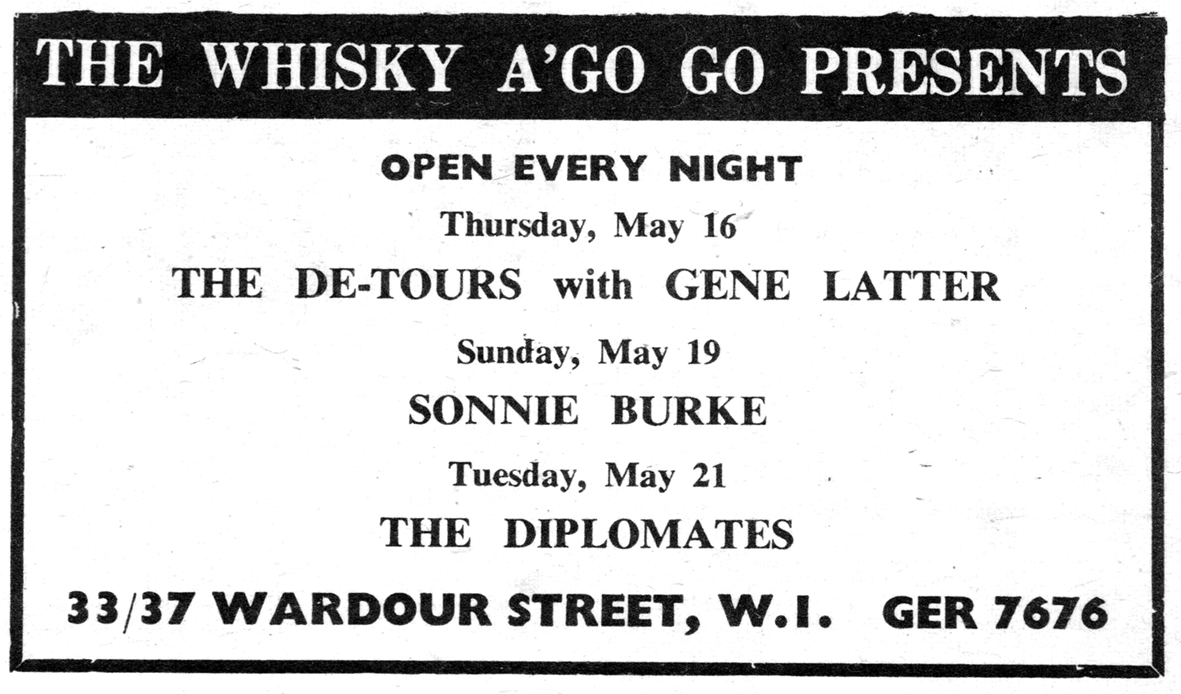
What about Lee Dorsey?
Steve Bingham: That was Michael who played with Lee Dorsey before we actually met.
Michael Gelardi: I was with a band then called The Zam Band and our manager had arranged a Sunday night gig at The Saville Theatre where we backed the American singer Lee Dorsey (‘Ride Your Pony,’ ‘Working in a Coal Mine’ et cetera). The show was hosted by DJ Rick Dane ( aka The Great Dane, who later coincidentally became a business partner and friend of mine). It was broadcast live on the pirate radio station Radio Caroline, and Pink Floyd were supporting acts with us on the bill. They had just had one hit, ‘Arnold Lane,’ and it was the first time I ever saw a band who brought their own light show with them!
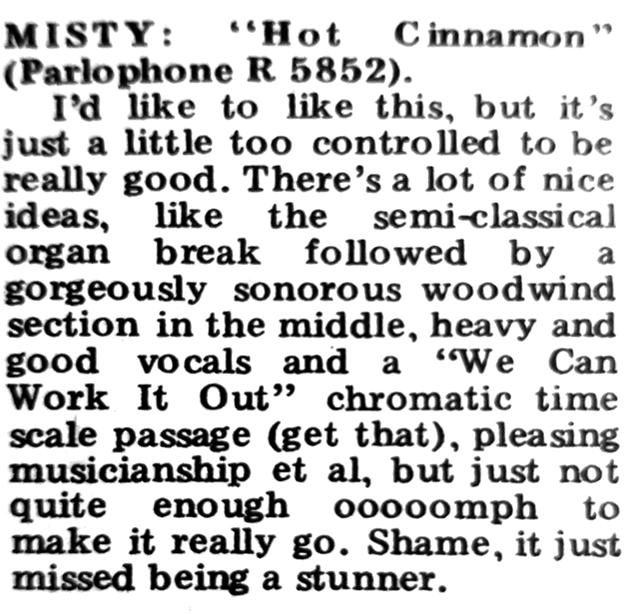
What led to the formation of Misty (and when was that)? How did you get to know each other?
Michael Gelardi: I met Steve Bingham in 1968, when I left college directly after my A-Levels and eloped with Pete, my drummer’s wife. First I was recommended as organist to a band in Leeds who had just been given a recording contract. Got into my father’s station wagon early one morning with Hammond Organ in the back, picked up Mary, and off we went up north to Leeds. I had never been north and was quite shocked at the state of cities like Leeds at the time. We arrived at a semi-detached council house and were welcomed by the band members, given some dinner and shown to a room with a “moth eaten” mattress in it and told that it was our bedroom. In the middle of the night I got up and said to Mary “we can’t stay here”. Fortunately I had not unloaded the Hammond, so we crept out at about 5am and drove back to civilization in London. Being then at a bit of a loose end, Mary bought the Melody Maker in which there was an advert for an organist for a soul band The Sonny Burke Show. We called and I went for the audition in a rather cold hall in Clapham – Sonny was well pleased with my playing (except that he said I played “too many notes”) and I got the job – Steve was in the band and a fine bass player, and after a few months we both agreed that we had more to give than soul music. We got together and started writing our own music, being classically trained, I introduced Steve to Baroque composers Bach, Handel and Scarlatti, all of whose works are included in Misty’s music.
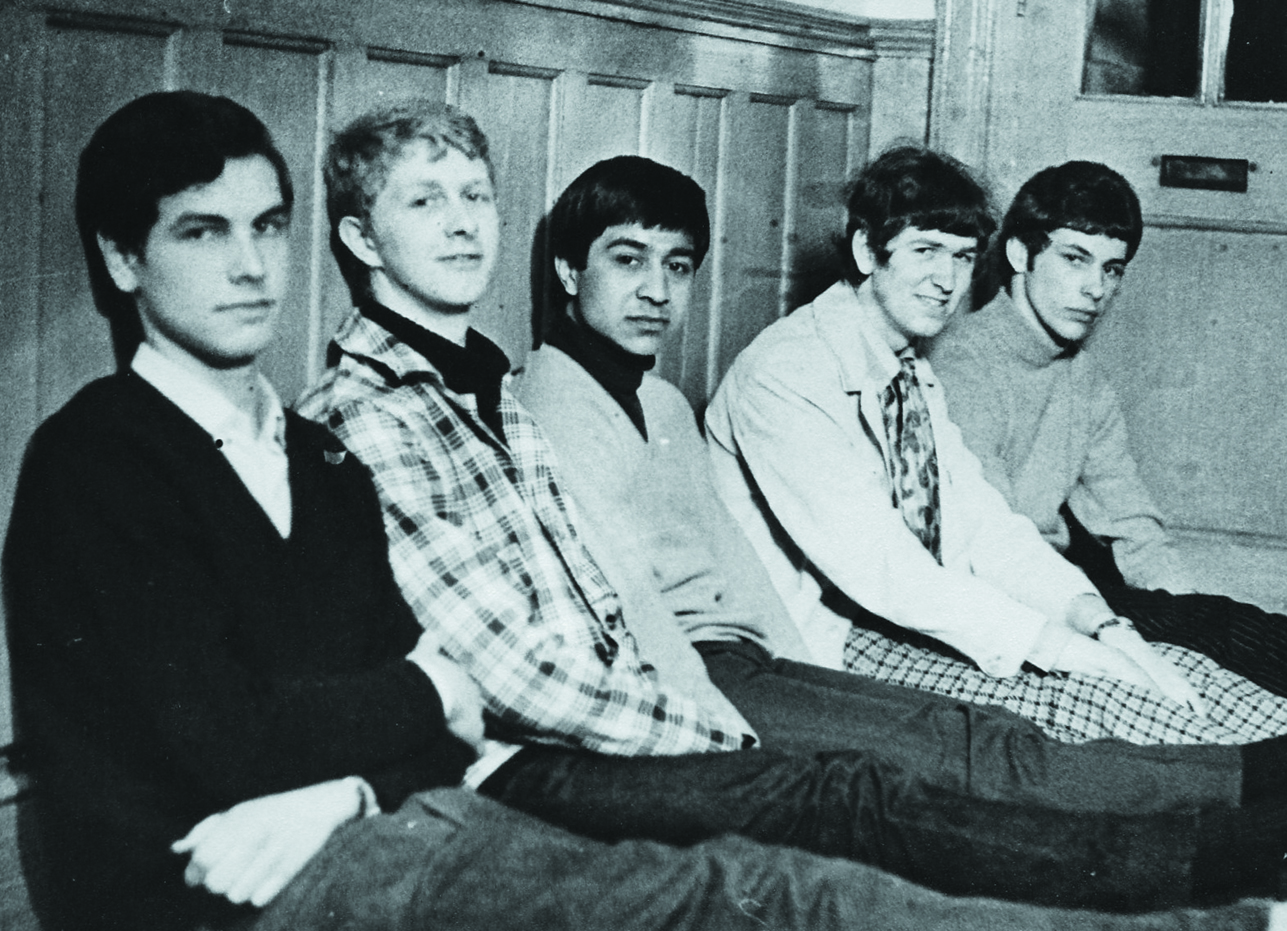
Steve Bingham: As I already explained we met in 1968 when Michael joined Sonny Burke and we very quickly became friends with a shared interest in exploring all kinds of different musical combinations and styles. Michael Gelardi was classically trained and I was really into Soul/Blues/R&B and Rock and it seemed like a very exciting venture to combine our two completely different styles which we did and very quickly began to get some great songs together. Eventually we decided to form a band and I moved into Michael’s mum and dad’s house in Weybridge Surrey where we had a dedicated music room and we composed and played from morning to night perfecting the songs and generally having a brilliant time doing it! Michael came up with the name Misty which was taken from a lovely jazz standard and it seemed like a catchy and very easy to remember name!
What are some clubs you played for? Who did you share stages with?
Michael Gelardi: Samantha’s, 606, Quaglino’s, Café Royal Green Room (London), Acapulco Club (Beirut), Floridita (Cuba) Pizza on the Park (London), The Jam House (Birmingham). Pink Floyd, The Nice, Roy Orbison, The Four Most, Lee Dorsey, Jools Holland…
Steve Bingham: Whilst I was living at Michael’s I was contacted by the manager of The Foundations who told me they had parted company with their original bass player Peter Macbeth and asked me if I would like to join them. As I needed money to keep going I decided to join them and it was around this time that Misty was given the opportunity of a residency at a nightclub in Beirut but they had to play popular songs rather than Misty originals so we went our separate ways for a while. During that time I played all over the country with The Foundations and also toured Scandinavia playing at many famous venues and sharing the bill with many top names including Deep Purple, Free, Jethro Tull and Jeff Beck. When Misty returned to England Mike asked me to rejoin as they had interest from a big management company and the prospect of recording our very own album and playing the songs live was obviously incredible news and I had no hesitation in joining up!
How did you get signed to Parlophone to record ‘Hot Cinnamon’ / ‘Cascades’?
Michael Gelardi: Our manager and agent was Michael (now Lord) Grade, who headed up his father Leslie’s agency London Management, a major entertainment company. His uncles were Lord Lew Grade and Lord Bernard Delfont, Russian emigres who came to the UK and basically took over the British television, theatre, film and entertainment industries. Lord Delfont was then on the Board of EMI, the largest record company in Britain who owned Parlophone Records – and the rest is history! Not necessarily the ideal label for our kind of band, but it was The Beatles label.
Steve Bingham: Mike’s father was extremely well connected and a very respected man in the hotel industry. He introduced us to Michael Grade (later to become Sir Michael and then Lord Grade!) Michael was the head of London Management who were a big entertainment company and he loved the songs we had written and subsequently signed us to Parlophone Records which was the Beatles record label. It seemed like a fantastic opportunity at the time but looking back it wasn’t necessarily the type of label that was committed to the style of Misty.
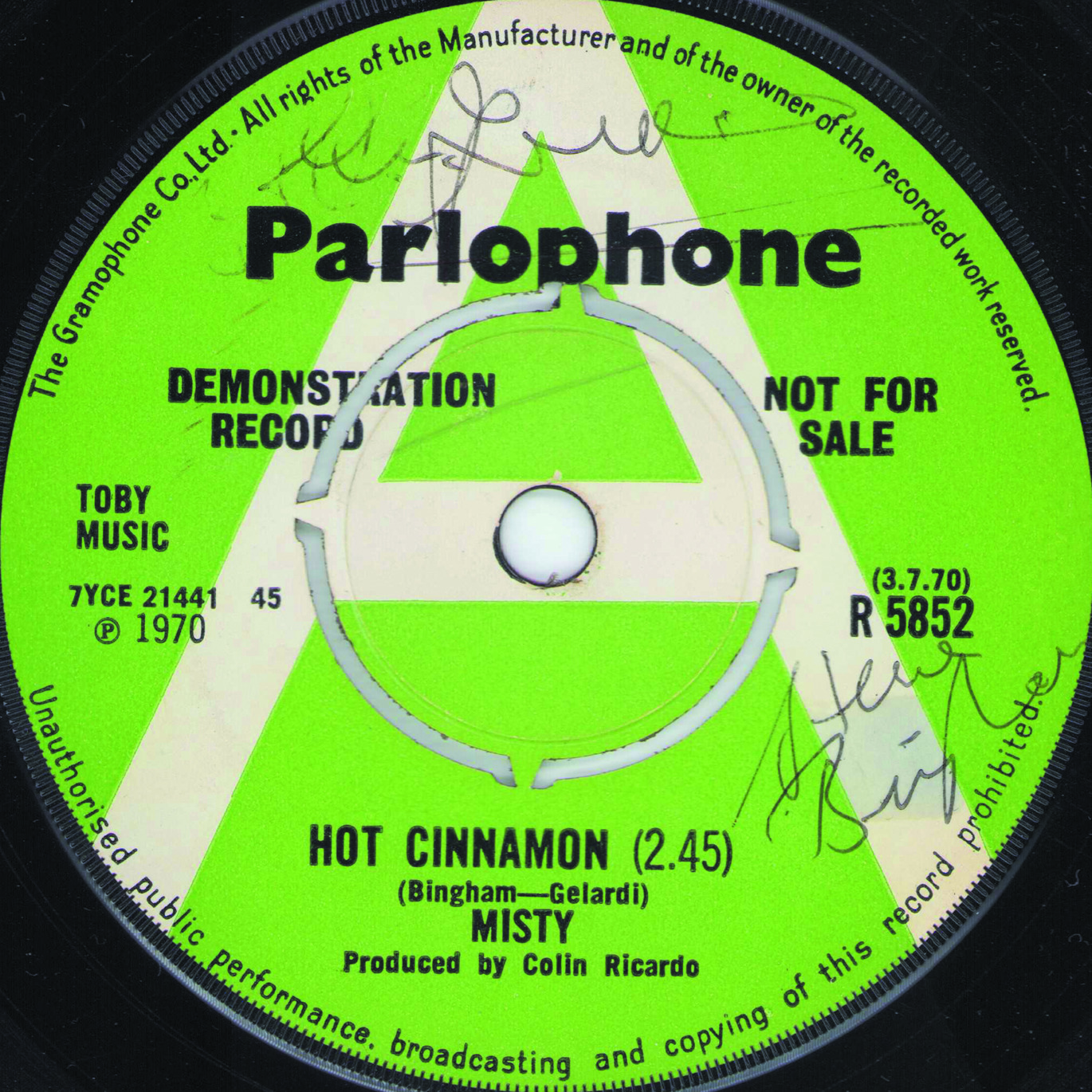
What are some of the recollections of the sessions for the single? What can you tell us about the songwriting aspect of the two tracks?
Michael Gelardi: We recorded the album at the legendary Regent Sound Studios in London’s Denmark Street (Tin Pan Alley the renowned home of songwriters). The studios had been used by The Beatles, Rolling Stones and Jimi Hendrix amongst other notables of the time. We were fortunate in having the amazing expertise of recording engineer Adrian Ibbetson (Ada), who worked miracles with just a 4 track studio and our somewhat demanding music. The album was produced by Jimmy Smith, who worked for Michael Grade and together we made an rather extraordinary album. ‘Hot Cinnamon’ was Steve’s composition with brass arrangements and classical intermissions (care of Bach’s D minor Fugue) by myself. It and ‘Cascades’ were actually recorded at Olympic Studios in London. ‘Cascades’ was written and arranged by myself with Steve playing a rather unusual aleatory (atonal) bass line. The inspiration of them I don’t think we actually recall!
Steve Bingham: The sessions for ‘Hot Cinnamon’ and ‘Cascades’ were done at Olympic Studios and not Regent Sound in Denmark St where we recorded all the other tracks on the album. ‘Hot Cinnamon’ was something I had written in my very small flat in South London and Mike wrote an amazing brass arrangement as well as slotting in a piece of Bach into the middle of the song which was a stroke of genius! He was responsible for ‘Cascades’ and I just played a strange bass line which seemed to somehow fit!! The thing that impressed me most was that the trumpeter in the brass section was the same guy who played the trumpet solo on Penny Lane by the Beatles!
Did you get a lot of press when it was released?
Michael Gelardi: No!
Steve Bingham: Sadly no! I remember Ann Nightingale playing ‘Hot Cinnamon’ on Radio 1 and saying how much she liked it so that was great exposure but generally neither of the tracks received a great deal of exposure perhaps because they were so original and certainly not contrived pop records.
Tell us about Michael Grade, who became your manager, proclaiming Misty to be “the future of rock music”…
Michael Gelardi: I think the answer is to use Michael’s own inventive and wonderfully optimistic forecast back in 1970: “Yesterday was The Beatles, The Rolling Stones, Cream; Today is Led Zeppelin, The Moody Blues and Deep Purple; TOMORROW will be MISTY. Sad to say we were Michael’s first, and his last, rock band, but his glittering career he has since taken him from Controller at British Channel 4 Television to Chairman of the BBC, and presently Chairman of Ofcom, the powerful regulator of all UK’s communications and media, plus of course a peerage.
Steve Bingham: I think Michael has already explained the history of how Michael Grade became our manager and to be honest I only met him a couple of times. The only thing I would say is that he didn’t know the type of market that Misty was suitable for and it was his first project involving the pop music scene so he wasn’t best equipped to deal with us!
Julian Brooks recorded and released a single with a song called ‘Lazy Guy’. You wrote this song? Tell us about the circumstances.
Steve Bingham: That was Michael’s project which I believe he has already commented on.
Michael Gelardi: I wrote this song just as a kind of pop song and Julian Brooks, who was also managed by London Management, recorded it. I don’t think it did much! I also did some transcribing for Julian for some of his own quite good songs.
You also appeared on Border TV twice?
Michael Gelardi: Yes. One of these broadcasts has recently been miraculously discovered by our ‘Number One Fan,’ Kevin Johansen, a retired London Police Detective and assiduous amateur music archiver, who found it in the British Film Archives.
Steve Bingham: Yes, that was amazing and I had forgotten all about it until one of the TV shows was discovered in the vaults of the BFI (British Film Institute) near Tottenham Court Road in Central London. We are going back 53 years since it was recorded and it was truly amazing to see it again after such a long time!!
How come the band broke up after one live gig on a package tour with Roy Orbison.
Michael Gelardi: We also did a great open air concert at Banbury College where we went down “a storm” but sadly no more were forthcoming as London Management didn’t really have those kinds of rock concert connections, and we decided to call it a day.
Steve Bingham: We did do a couple of other shows but being on the same bill as Roy Orbison was incredible. Basically although we had everything in place to be a live working band there was not a huge demand for us and London Management failed to get us a proper recording deal for the album and the financial backing was no longer forthcoming. I then rejoined the Foundations and Michael went into the music industry and subsequently became extremely successful.
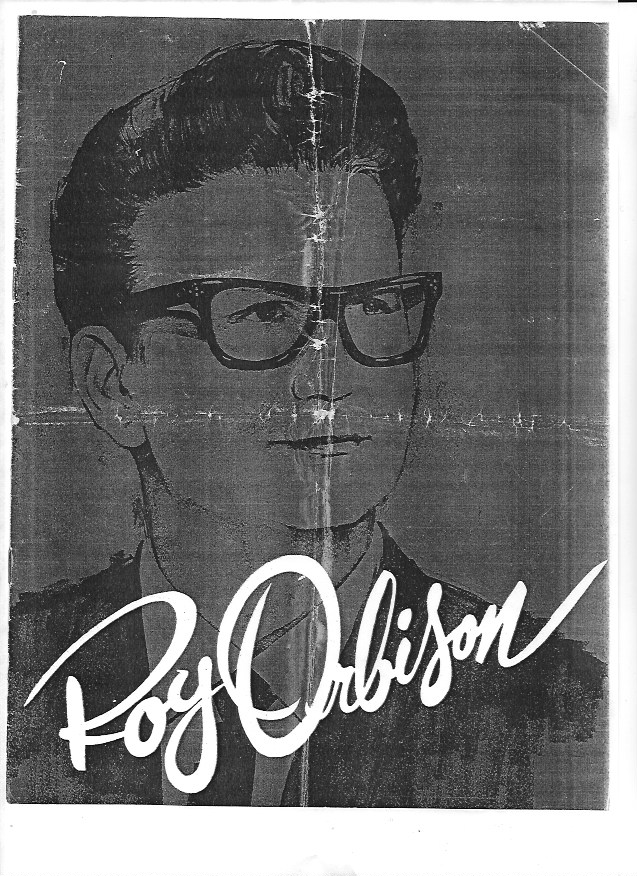
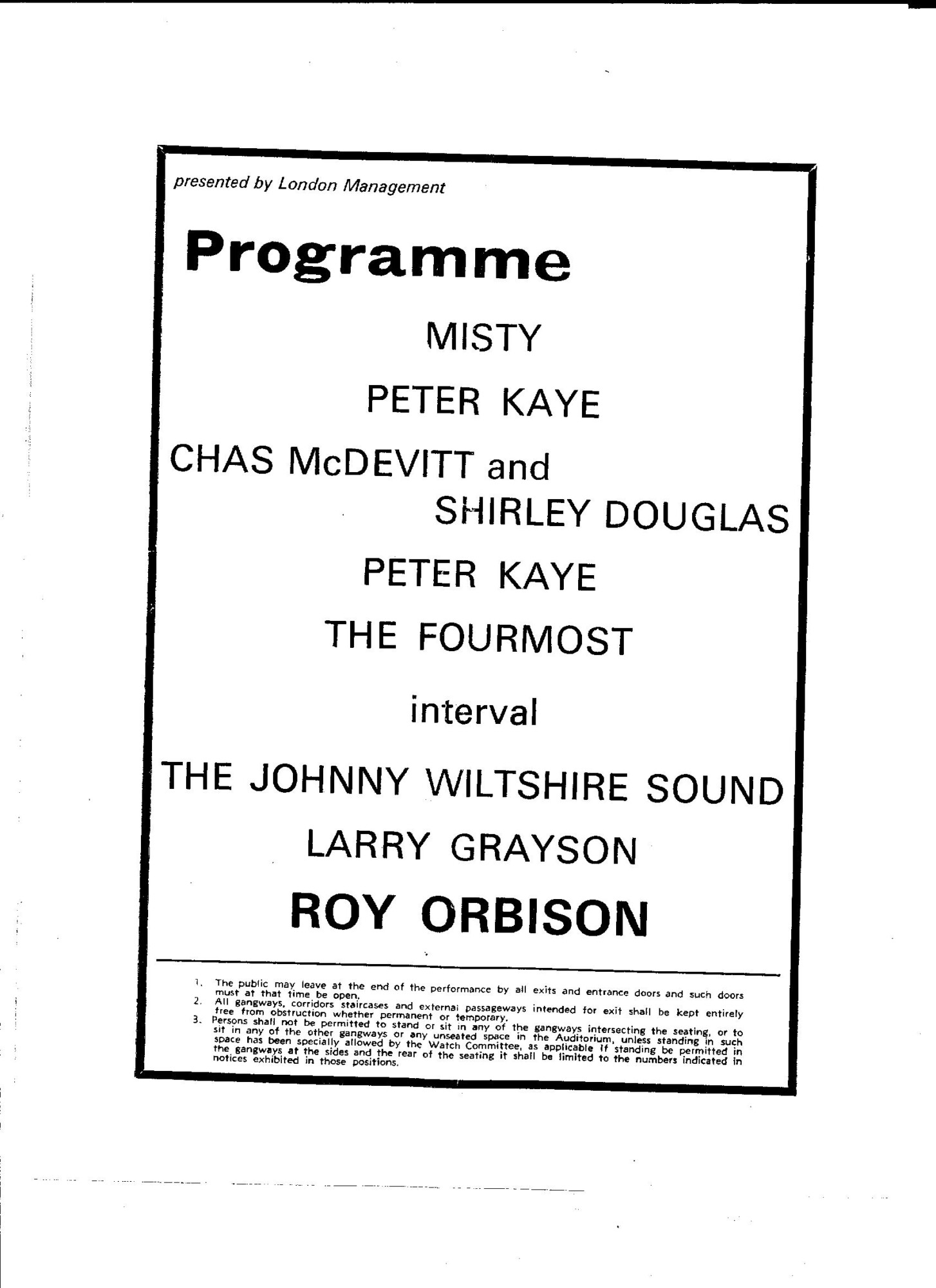
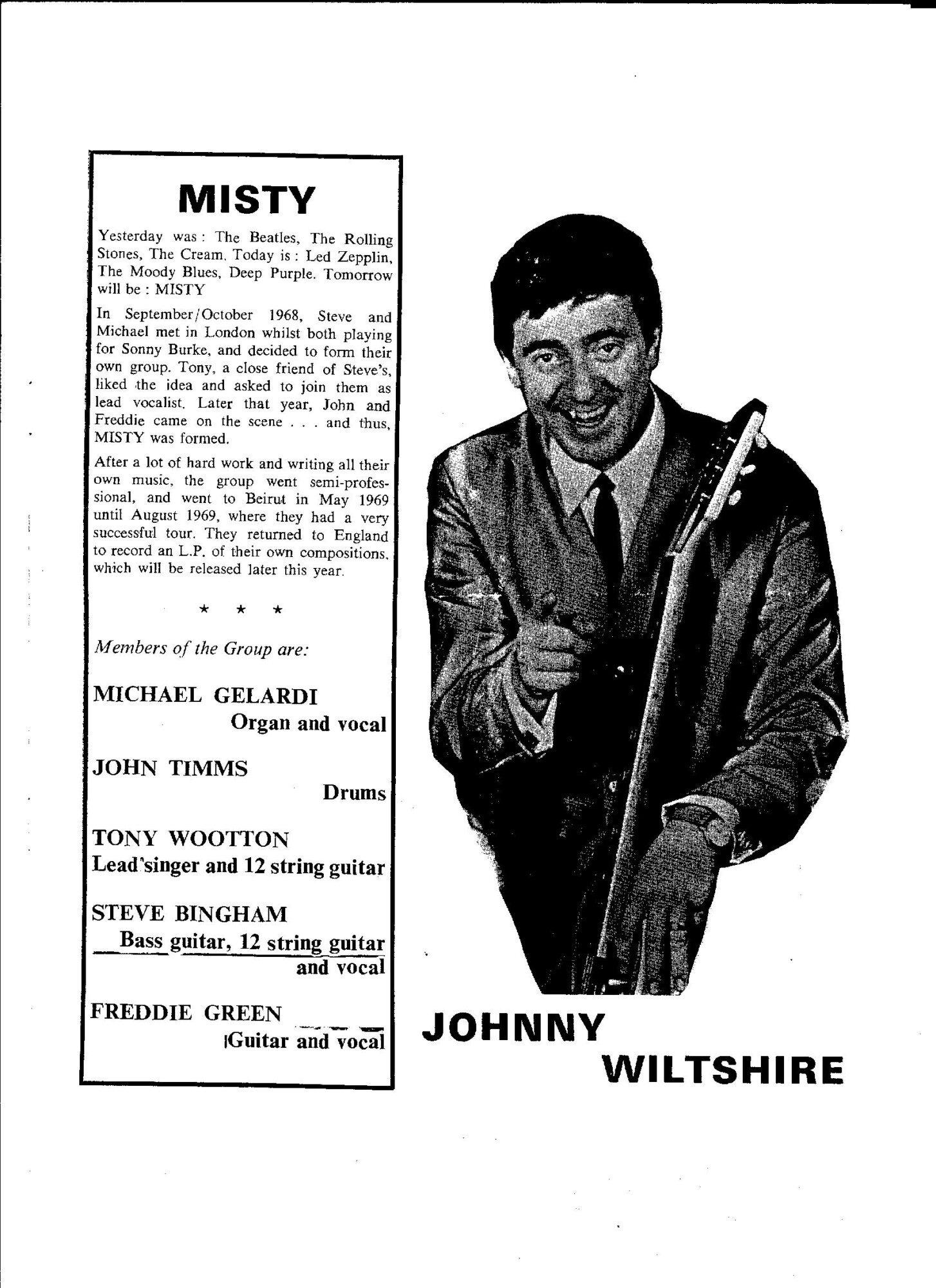
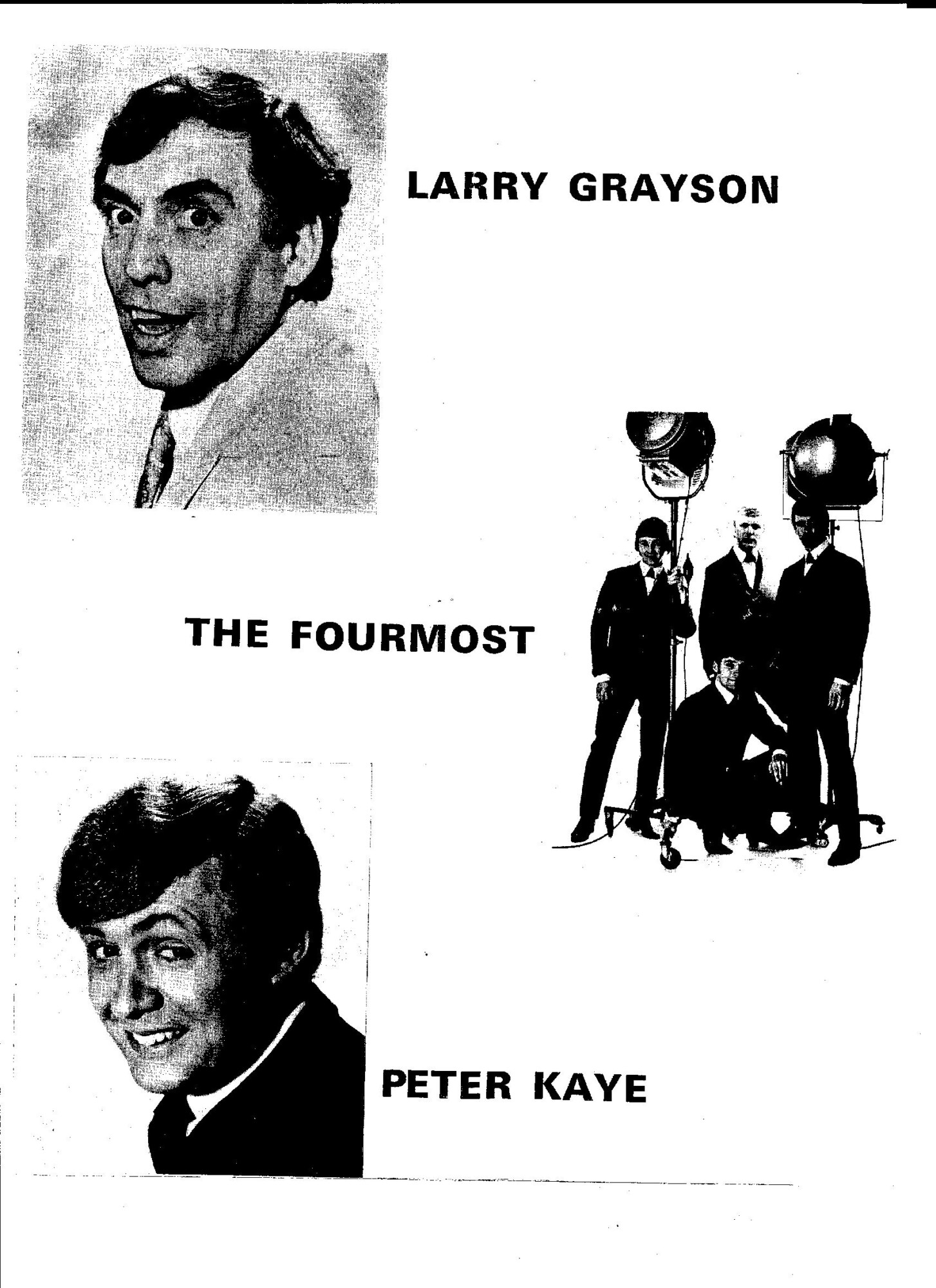
When did you enter the studio to record ‘Here Again’? What’s the story behind those recordings? Where did you record it? What kind of equipment did you use and who was the producer? How many hours did you spend in the studio?
Michael Gelardi: ‘Here Again’ was written by Tony Wootton, our lead singer/guitarist, and recorded at Regent Sound as part of the album. It was in a 4-track studio, produced by Jimmy Smith (not the organist) for London Management, myself and Adrian Ibbetson, and I seem to remember we took three days to record the whole album.
Steve Bingham: Here again was recorded around 1969/1970 at Regent Sound Studios in Denmark St. Central London and it was produced by Jimmy Smith who worked for Michael Grade. Actually the recording expertise came from the engineer Adrian Ibetson who achieved astonishing results from a 4 track recording machine! The album was a result of many hours spent writing the songs with Michael Gelardi and then rehearsing them with drummer John Timms who sadly passed away some years ago and also Tony Wotton who was our lead singer/acoustic guitarist and he also wrote two of the songs on the album. I actually met Tony whilst working with a band called The Spiral in Birmingham and I recommended him to Michael when we needed a front man.
Only acetate was released? Who had it in possession all these years?
Michael Gelardi: The album was never released and the acetate somehow remained in my possession, actually unbeknown to me, for all these years. It was discovered by an ex-girlfriend of mine in my record collection about 15 years ago.
Steve Bingham: The acetate was never released and I didn’t know it even existed until Michael got in touch with me to say his ex-girlfriend had discovered it in his record collection!!
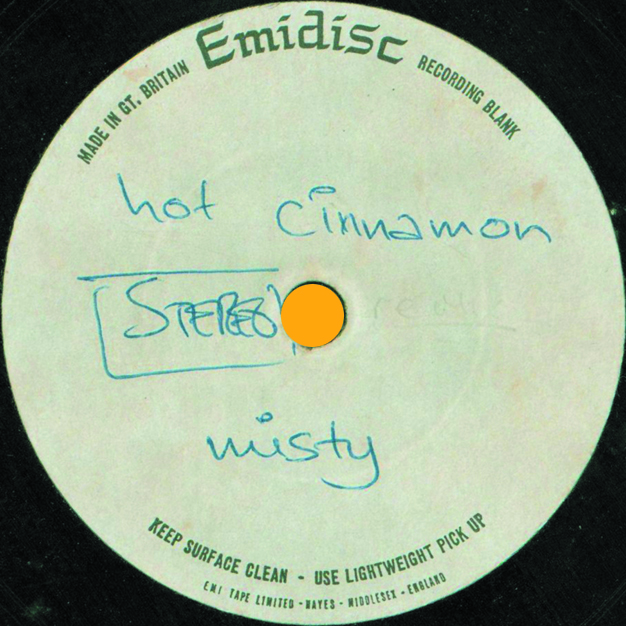
“We were lucky to have a great recording engineer”
Please share your recollections of the sessions. What were the influences and inspirations for the songs recorded?
Michael Gelardi: The sessions were interesting in that the pieces, instrumentally and vocally, were quite intricate and a 4-track studio by today’s standards was very basic. We were lucky to have a great recording engineer, Adrian Ibbetson, who was pivotal in creating some of the wonderful, particularly vocal, sounds you can still hear clearly on the album today.
Steve Bingham: The sessions were incredibly professional because the band was so tight and well rehearsed. We recorded it very quickly as we had a limited budget. There were so many different influences and inspirations for the songs that it’s difficult to pinpoint individual things but we all really liked an American band called Love which was fronted by Arthur Lee. The influence of their sound can be heard on the title track ‘Here Again’ which was written by Tony.
Would you share your insight on the albums’ tracks?
Michael Gelardi: Interestingly I think they cover a number of issues strangely relevant still today, from love relationships (obviously!) to war issues to mental health problems et cetera.
Steve Bingham: Many of the songs had their roots in my little bedsitter flat in Clapham, South London. I had so many different ideas for songs and it was just amazing when I played them to Michael Gelardi as he almost instantly knew how to progress them and his classical influences are there in nearly every track.
Was there a certain concept behind the album?
Michael Gelardi: Not really. They were compositions by three songwriters/musicians which somehow came together and emerged some 50+ years later as a kind of “panacea of classical/rock/pop art”!
Steve Bingham: It was just a collection of songs that were a mixture of my Soul/Rock/R&B influences taken to another level by the arrangements and the inclusion of some amazing classical pieces by Michael.
What happened after the band stopped? Would love to hear what occupied your musical career later on? What are some of the albums and bands you were part of?
Michael Gelardi: I went on to get a job of assistant to Geraldo, a legendary band/orchestra leader from the 40’s/50’s who still performed annual concerts in London and also ran his own music agency Geraldo Orchestras. I later formed my own entertainment agency which was taken over in 1978 by hotel and leisure conglomerate Trust House Forte PLC to form their own music and entertainment division, which I headed up for some 20 years until a hostile takeover of the group by Granada PLC, and I am proud that we built that into one of the largest entertainment supply companies in the UK. During that time we produced shows with some of the greatest artists of the day, including Sammy Davis Jnr., Lena Horne, Ella Fitzgerald, Oscar Peterson, Sarah Vaughan, Count Basie & Duke Ellington Orchestras, Bob Hope, Victor Borge, Andy Williams, Engelbert Humperdinck, Glen Campbell and others. I was later a director of Musical Festivals PLC which promoted music festivals including The Hop Farm in UK and Benicassim in Spain, where we featured artists including Bob Dylan, The Eagles and Prince. I was a major shareholder and director of a company called The Entertainment Corporation with which we toured the Bolshoi and Kirov Ballets, and acquired for some years the exclusive contract to tour every performing arts artist in Russia. I was also cofounder of Jazz FM radio in the UK and produced various charity shows featuring stars from Bob Hope to Take That. I then semi-retired but presently have my own entertainment company and am MD of Boisdale Entertainment, a division of the Boisdale Restaurant Group.
Steve Bingham: When the band broke up I rejoined The Foundations and subsequently became a “session” player working both live and in the recording studio with Colin Blunstone (the album ‘Ennismore’) and also Ronnie Lane when he left The Faces to go solo. I toured with him and played bass on his first solo album ‘Anymore for Anymore’. I’ve also recorded with Gallagher and Lyle, Mathew Fisher (Procol Harum’s organist), Stax superstar Eddie Floyd, P.P. Arnold, Jimmy James, Pauline Black (The Selecter) Andrew Lloyd Webber and Tim Rice and of course Geno Washington and the Ram Jam Band with whom I’ve performed on over 1,000 live gigs throughout the UK and Europe. I still perform live regularly with Geno and also with Ronnie Lane’s band Slim Chance. I also run two small independent record labels and have my own music publishing company which is administered throughout the World by Universal Music.
Is there any unreleased material related to the project or to the band members?
Michael Gelardi: We have a small collection of tracks we call ‘Apres Misty,’ and Tony Wotton, Misty’s singer and I, have recorded around 100+ cover tracks over the last 20 or so years, under the name of The London Baby Boomers.
Steve Bingham: Not to my knowledge although there is a brilliant instrumental version we did with Misty of ‘633 Squadron’ which isn’t on the album so you never know! We also have a brand new live album with Slim Chance which is being released in February and there may be some new Geno Washington tracks released in 2024.
“Most memorable gig was probably supporting Roy Orbison”
Looking back, what was the highlight of your time in the band? Which songs are you most proud of? Where and when was your most memorable gig?
Michael Gelardi: Can’t think of a particular highlight, other than perhaps than first listening to the finished acetate of the album with Steve at London Management offices on Christmas Eve 1969. I think all of the tracks have their moments, but if pressed on best for me I personally would choose ‘Hot Cinnamon,’ ‘Here Again’ and ‘Final Thoughts’. Most memorable gig was probably supporting Roy Orbison at the Birmingham Odeon. Not many to choose from!
Steve Bingham: It was an amazing experience every day to work and write with Michael on the Misty project and I’m proud to be involved with all the tracks on the album. I co-wrote 11 of the 13 tracks and played bass on all of them so it’s very much a part of my life and it’s almost miraculous that it is being released on vinyl in 2024. It’s been a long time coming but what an exciting event to happen at long last! I enjoyed every gig but there was a particular one at Banbury College that was amazing. Also meeting Roy Orbison and being on the same bill was a huge thing for us and unforgettable.
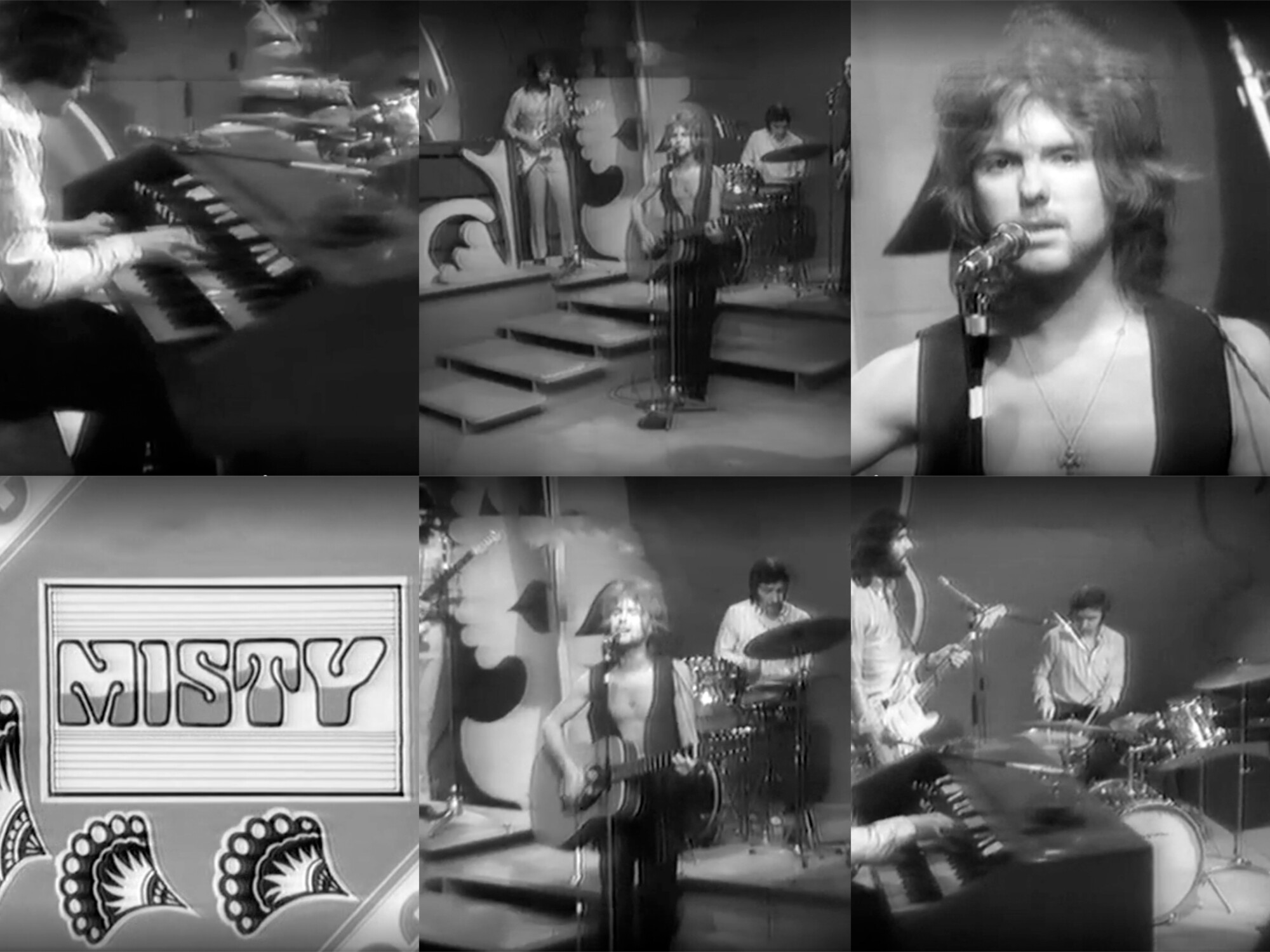
What currently occupies your life?
Michael Gelardi: Amongst other projects I am also working with Sir Trevor Nunn on an immersive theatrical musical based on the life and works of Andy Warhol and with established film producer Stephen Evans ( The Madness of King George, Henry V et cetera) on the soundtrack of a film about the life of renowned footballer George Best. Oh yes, and ex-girlfriends who ended up getting married to someone else, are now getting divorced and coming back. They tend to occupy quite a bit!
Steve Bingham: Much of the same! I spend a lot of time organising gigs for Geno Washington and Slim Chance as I’m also involved in the management of both bands. I also have a home recording studio and I’m at the start of a long journey to record a solo album. It’s something I’ve always wanted to do but it’s only since my studio has been up and running that the dream can now become a reality and I don’t have to rely on anyone else for funding.
Are you excited about the vinyl release coming out via Sommor/Guerssen?
Michael Gelardi: Of course I’m sure we all are, and are looking to plan an appropriate PR campaign when we know the date of vinyl release.
Steve Bingham: Very much so! It’s a truly amazing thing to be happening and I just wish we could get Misty back together again and go back in the studio!! I’ve been planting the seed into Michael’s brain so never say never!!
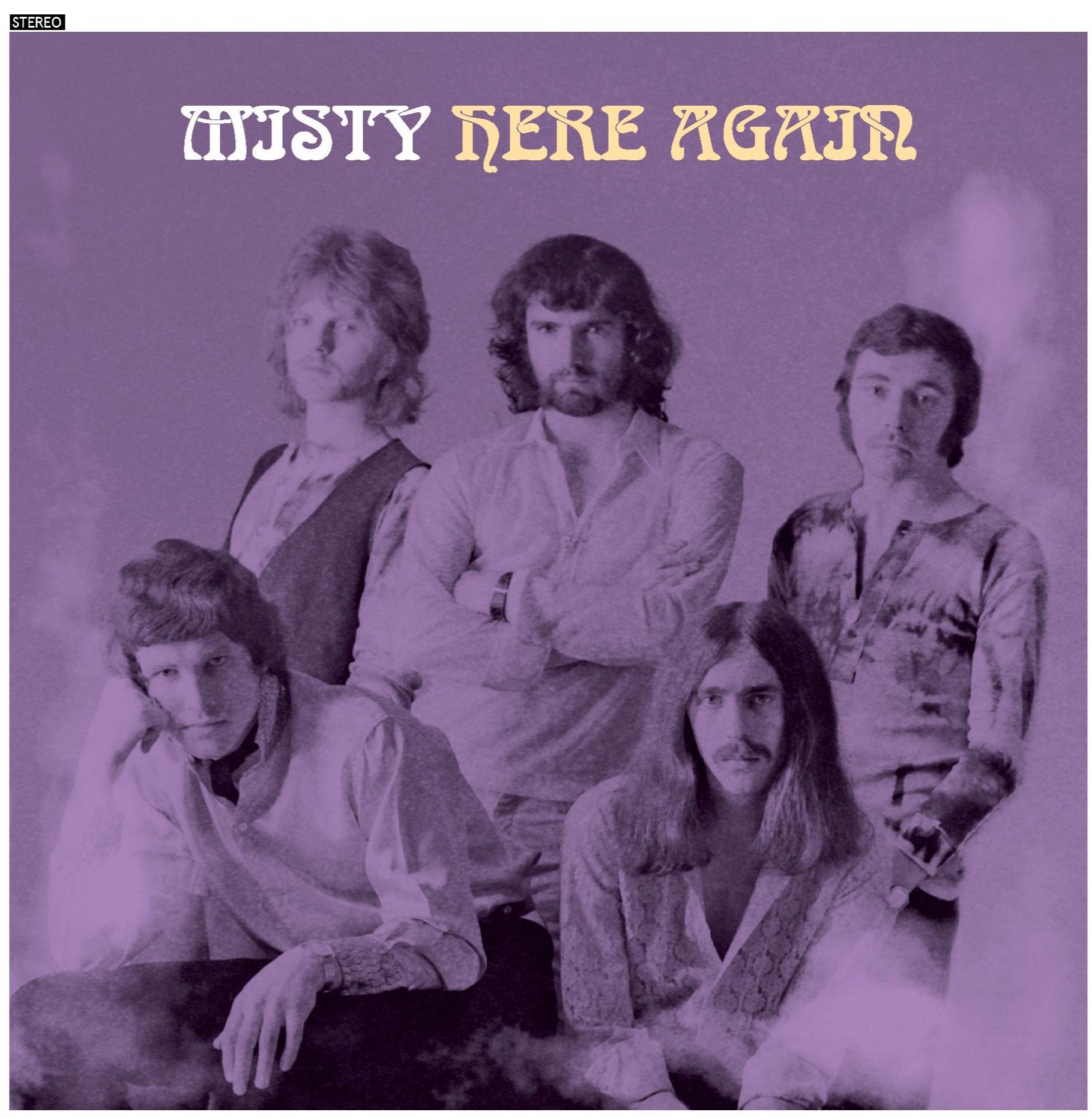
Thank you for taking your time. Last word is yours.
Michael Gelardi: I think the last words should be with Lord Michael Grade – “Tomorrow will be Misty” We live always in hope.
Steve Bingham: Thanks Klemen! Your interest in the band is deeply appreciated and I hope this gives you a good insight into the amazing project that is “Misty”.
Klemen Breznikar
Headline photo: Misty, early days
Guerssen Official Website / Facebook / Instagram / Twitter / Bandcamp / YouTube

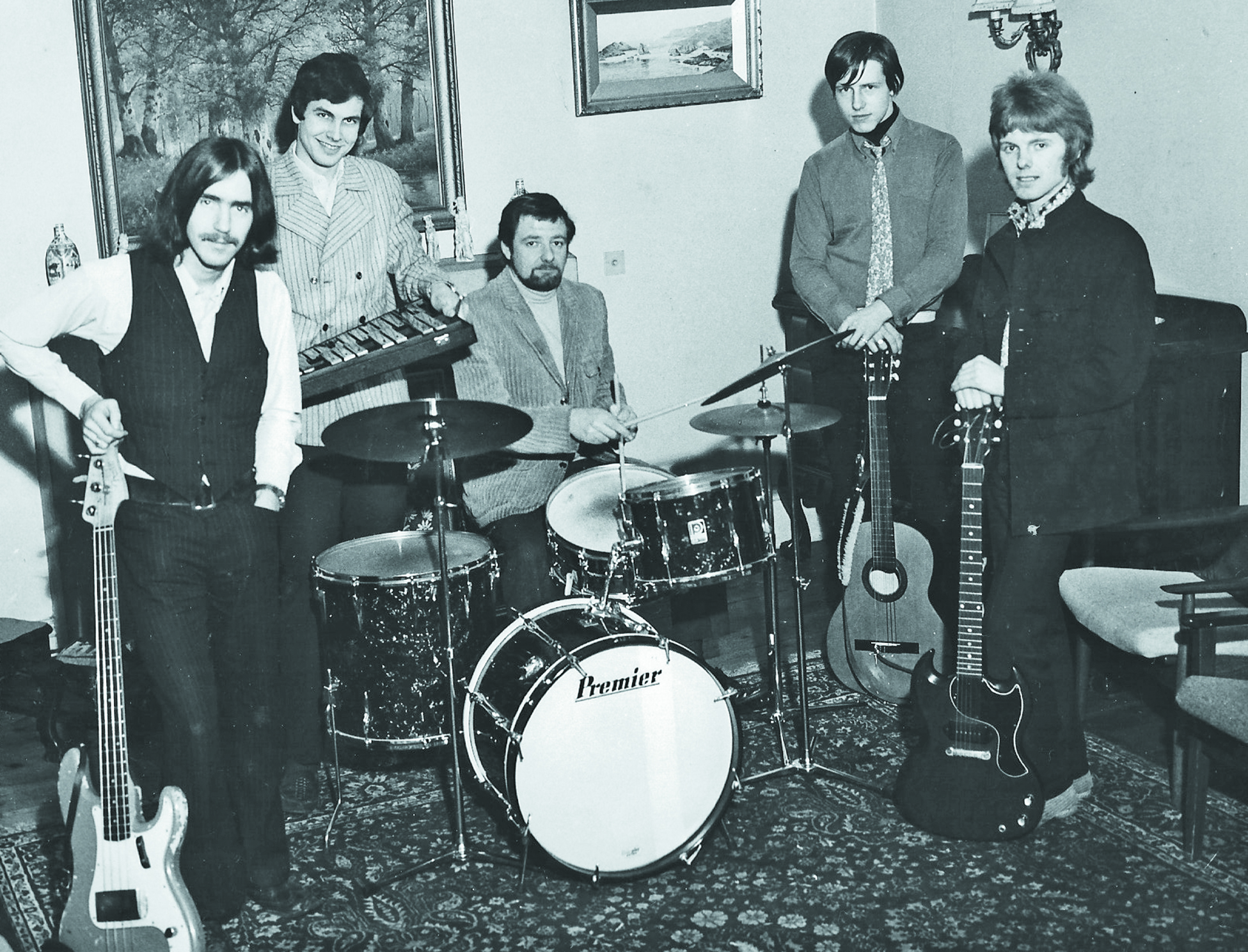
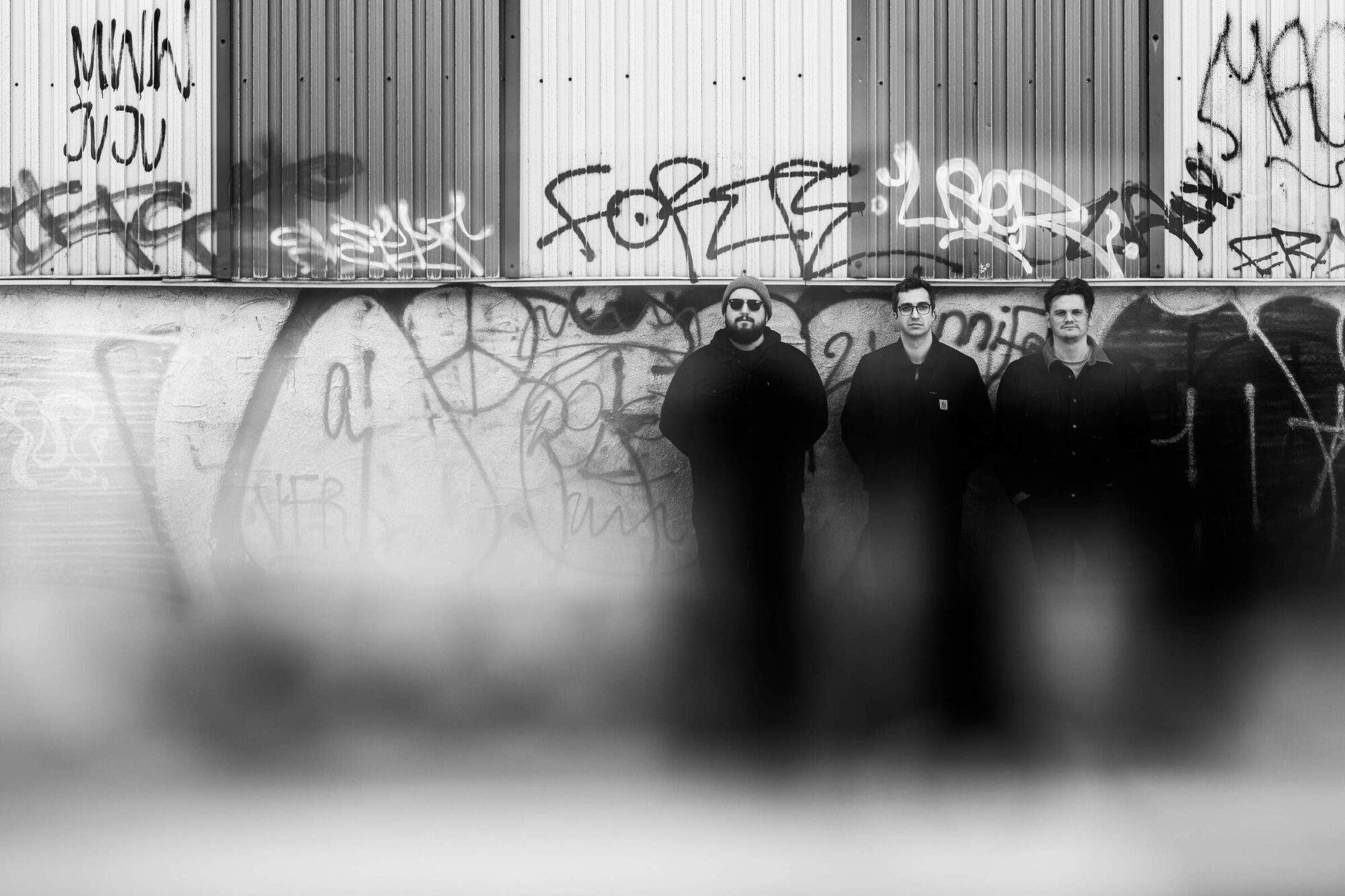
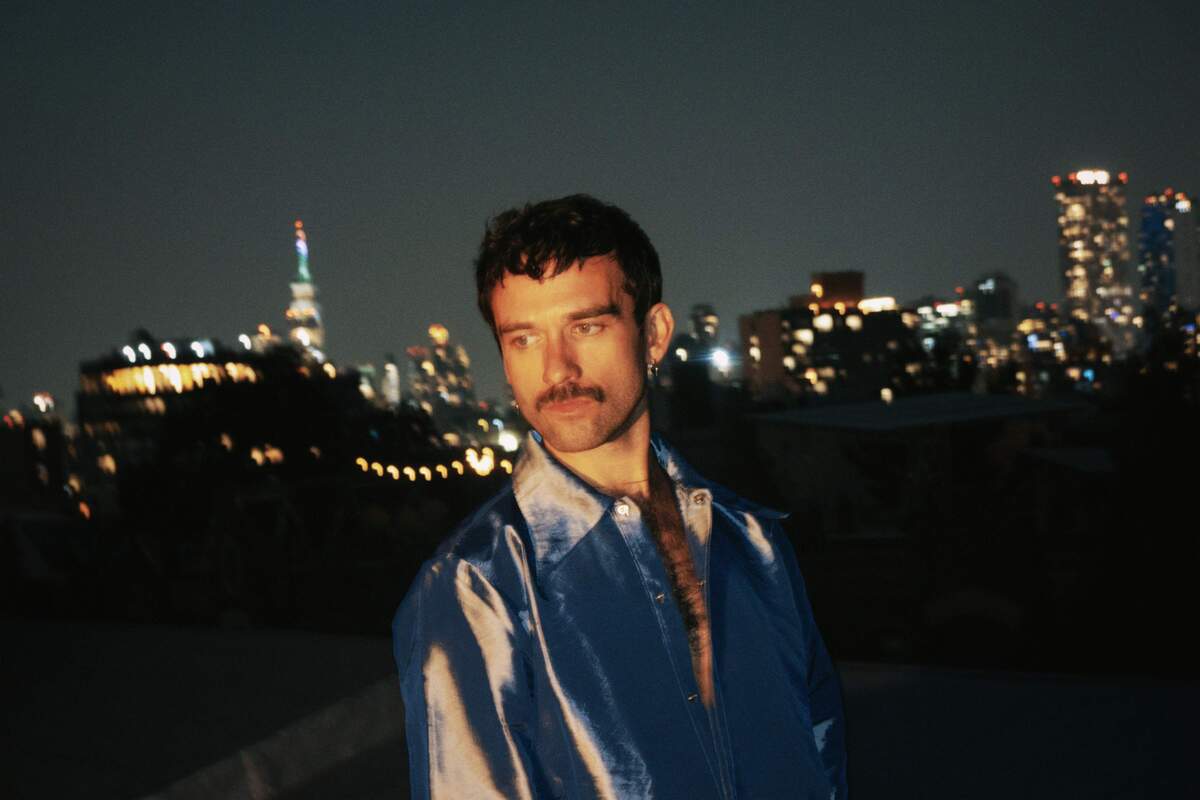
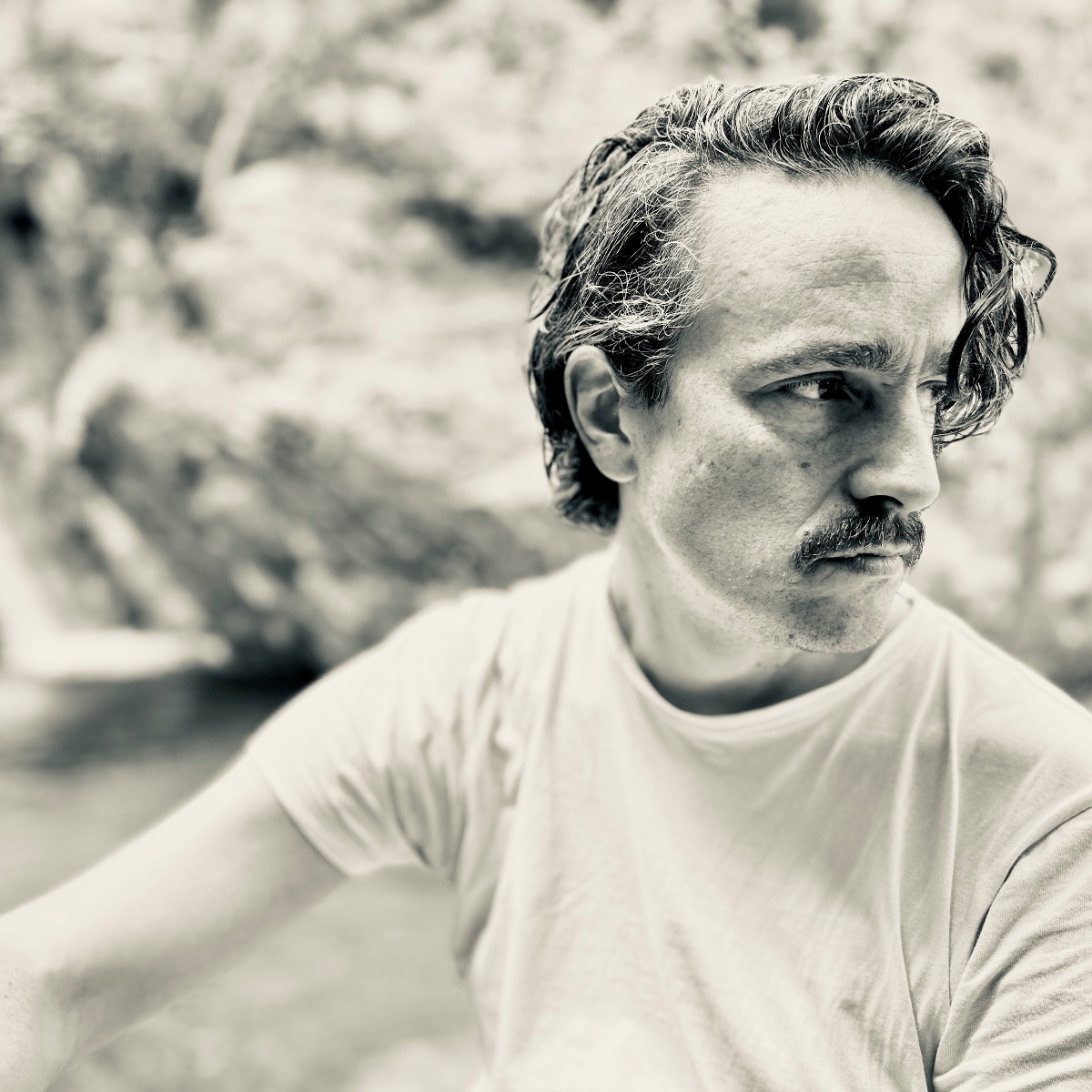
Brilliant! I am one of Mike’s school friends and remember a lot from the early days, in particular the Zam Band (feat “Zuzu”!). Kremen I see you have also interviewed John French, I have the Beefheart Vinyls from 69-71.